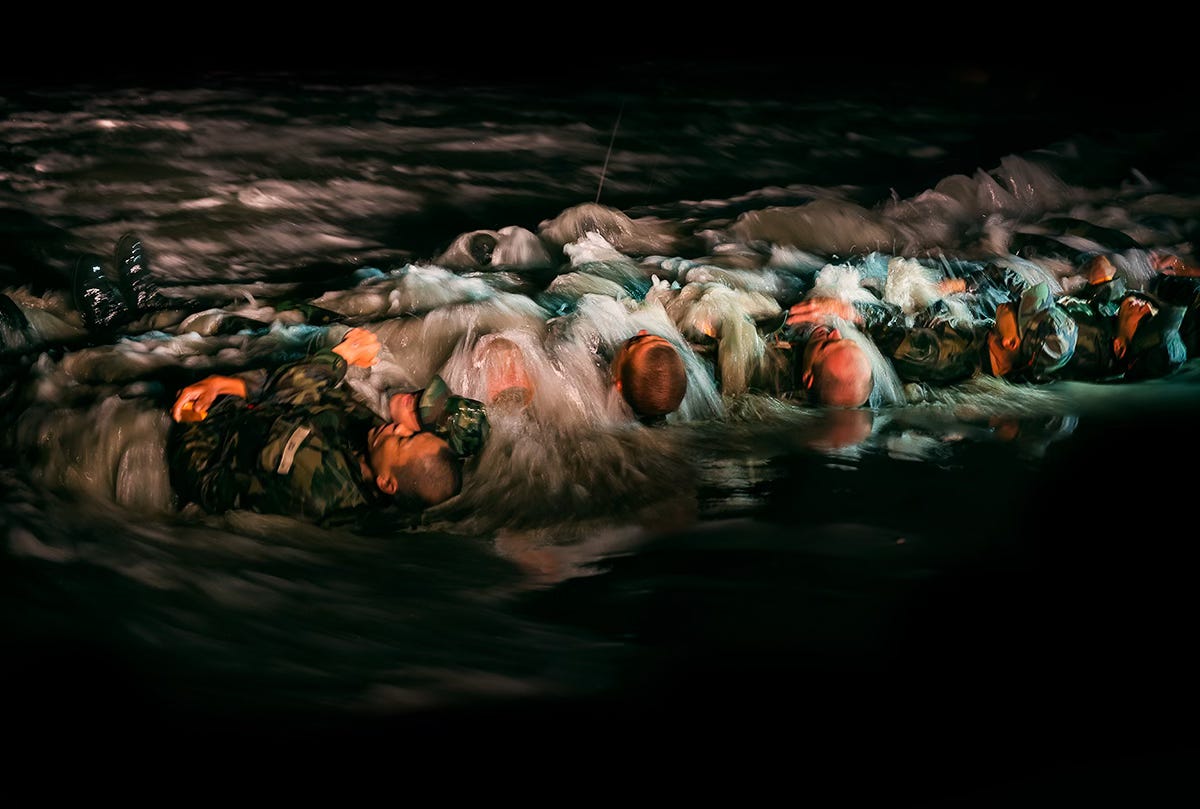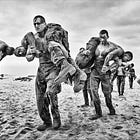Finding the Sublime In Hell: A Lesson from Hell Week
Loudspeakers, rituals, and a path forward
Welcome to What then? These essays are designed to challenge. Not in the sense that they are hard to understand, but in that they take chances, ask questions, and attempt to hone in on something crucial about our times and our purpose here.
It is a passion project, pure and simple.
Thank you for being here.
Let’s get to it.
Hell Week is a five day ritual from Sunday to Friday.
Myself and the other candidates had not slept in three days. It was Wednesday night, and we had two days left to go.
We stood in a line facing the sea. The refractions of the moonlight glimmered on the waves and whitecaps sprawling to the blackened horizon. Our elbows were linked as we stood in silence, and our bodies shook uncontrollably from the cold. Urinating in our pants gave us approximately twenty seconds of warmth. Our wet camouflage ground sand into our waists, thighs, chests, and arms as we ran and swam and crawled and climbed, until bloody reddish water oozed from the wounds. The skin on the bottom of two of my toes has fallen off and formed little waxy balls in the tips of my socks.
The instructors lurked behind us and we waited for them to key up their loudspeakers. It was eerily quiet. Were they going to tell us to march into the sea again? The previous three days were a non-stop barrage of explosions, gunshots, screams, threats, and commands.
This is a recording of my own Hell Week that an observer took. It is a ninety second snapshot of five continuous days of hell. The voice on the loudspeaker is Kevin Stark and the wretched voices responding are mine and the other candidates. Despite the demonic tinge to his voice (calculated), he was my favorite instructor (when Hell Week was finally over). He knew how to bring about true change with a striking combination of brutality and empathy, an ancient and almost forgotten skill. He now teaches how to forge excellence (minus the brutality) with The Arete Path.
I realized they were turning silence into a weapon: for the first time in three days, we were allowed to fill the silence with our thoughts. A candidate quit and the line was broken. He walked up the beach to a warm and idling ambulance and he was given a blanket and a hot cup of water. An instructor, suddenly all smiles, sat down beside him, orchestrating an affectionate—and calculated—scene reminding us we did not need to do this. We had seen many like it.
The loudspeaker keyed up, and a voice droned: “Forward march.” Another candidate broke the line and shuffled to the ambulance. The gap was silently filled with linked elbows. We marched into the cold water and let loose eerily loud exhales like whales breaching the surface and emptying their lungs. We laid down in a line and let the waves crash on our faces and bodies. Our locked arms prevented us from being thrown twenty feet at a time. The cold, the sand, the uncertainty, the pacing instructors, the seething sea in the dark—each made us hyper-aware of the legion of voices within our skulls; each of these voices attempted to gain supremacy of our minds; each of these voices made us turn inwards and ask ourselves, “Can I do 48 more hours of this? How is this even possible?”
I had heard no one quits after Wednesday night. Make it to Wednesday night, and you will make it to Friday.
There is a reason.
I was on the cusp of learning it.
The loudspeaker keyed up, and a voice droned: “Get out of the water.” We awkwardly stood up with arms linked, and slowly slogged to shore. The loudspeaker keyed up, and a voice droned: “About face.” We turned around once again and faced the sea. We were waiting to see if they would tell us to march forward again… and again… and again… and each of us would have to choose: the cold surf or the warm ambulance. The silence was louder than the gunfire it replaced. An instructor keyed up the loudspeaker and the high-pitched squelch assaulted our ears. We braced for the command, but the instructors did not give it. It was a test. Another candidate could not bear the voices in his skull and stumbled to the ambulance.
Suddenly, I felt a change inside of myself. I felt at home. I looked up at the full moon and I saw it as if for the first time in my life. Neither the future I sought nor the past I sought to be rid of mattered anymore. This singular moment in time was all that existed, and it was suddenly enough. Though my skull was vibrating as my body fought off hypothermia, my eyes within their sockets were steady. I admired the perfect edges of the moon; its luminous white mass surrounded by the infinite blackness of space suddenly struck me as significant. Suddenly, as every muscle in my body spasmed and quaked and my skin bled in agony, my mind became calm.
One voice was left in my skull and the skulls of those who made it to Wednesday night, and the voice said this: I know I can grind unto death.
Our instructors, our guides in this controlled brutality, had gone through this ritual themselves. They knew this moment would come. In each of us, a primal switch had been flicked forever. From this moment forward the instructors no longer pushed us—they now held us back. For they knew we would swim, run, and crawl into our graves if they let us, simply because we knew we could and it felt good to know this about ourselves.
The experience of existence became a binary: either we will excel in this moment or we will die. There existed no middle ground. It felt free. It felt like a savage Yes to all that may come.
I realize now I had experienced what Edmund Burke called the “sublime” in his 1757 treatise A Philosophical Enquiry into the Origin of Our Ideas of the Sublime and Beautiful. But my experience was different. For Burke, our response to the sublime is physiological. For me, it was existential. This difference is significant for our era, as we will see.
He identified four key features of a sublime event: fear, obscurity, infinity, and power. Let us leave Burke behind, and view these features through the lens of a ritual like Hell Week.
The sublime arises from fear, but a fear mediated by safety. In a ritual, the fearful promise of pain, injury, misery, doubt, uncertainty, and death may be met with faith in ourselves.
The sublime also involves that which cannot be fully understood. I did not understand why my discovery of the primal switch was hidden from me by our non-primal world. But by unearthing it—and realizing a radically different mode of life was possible—my entire purpose here had been reframed. It initiated a lifelong obsession with understanding who we are, the world we have constructed, and what we can do about it.
The immense scale of the sublime overwhelms our comprehension. I was in awe of the moon and its milky whiteness amid an infinitely black and vast cosmos. It taught me I was merely a tiny spark of consciousness allowed the chance to witness this spectacle. It struck me how unlikely—and lucky—I was to exist.
Lastly, the sublime is defined by overwhelming physicality—by power. I love the sea not for its power to snuff out our existence on a whim, but for what this power reveals within us: the sea introduces us to ourselves. The power of the sublime puts us to the question and demands an honest answer: it asks, “Do you know who and what you are? Are you willing to take responsibly for yourself, or do you wish to drift unto death?”
Now some may say the self’s smallness before vast natural forces hints at an evolutionary anxiety about our limits as Homo sapiens; a reminder to take a step back and be humbled by our weakness to ensure we do not take undo risks with our lives. That may be true evolutionarily, but it means nothing philosophically. For this same smallness is actually proof of our massiveness, if we choose to stand unbowed before the apocalyptic forces of sea, space, earth, and man.
It is therefore no surprise that elements of the sublime can only arise in hell—addiction, cancer, combat, earthquake, hurricane, and most importantly, in ritual.
And yet our modern world is at war with the sublime and its four ingredients. It is anti-ancestral-ritual. It is even anti-modern-ritual, for there are those who constantly cry for the abolishment of Hell Week. What a symptom of the disease of our times.
Now it is of interest modernity does not get rid of the ingredients of the sublime—it corrupts them.
Anxiety has replaced fear. One terrifying entity or event has now been replaced by countless unsettling entities and events: professions, hierarchies, trips, shows, phones, computers, and a gnawing uncertainty as to what the hell the point of our lives is. Obscurity of ancient human truths has been replaced by obscurity of modern human un-truths: millions of tanned, bejeweled, and apparently blissfully happy influencers and celebrities and millionaires on screens across the earth, who live what appear to be endlessly perfect lives in comparison to our own. Even the moon and stars are replaced by digital rabbit holes. But these rabbit holes do not lead to an awakening on a cold beach. Instead, they lead to infinite little digital hells burrowed into the nihilistic bowels of the internet. And what of the vast power of nature that introduces us to ourselves? The sea, mountain, and sky? The simple but brutal power of nature is now replaced by abstract institutions, laws, and customs whose supremacy often depends on us never learning who and what we are.
And so we arrive at an uncomfortable truth of the modern world.
In the ancient world, we see tiny specks in an infinite cosmos standing tall when faced with overwhelming power. In the modern world, we see giants in a fiction shrink, fold, and fall in the face of overwhelming triviality.
It seems, then, the modern world intended to free of us from the pain of the sublime, from the cruel realization of our limits. But the outcome was to free us not only from pain and introspection, but what followed from them: a Yes to life. We were designed to scream Yes to life in the eye of a hurricane, holding onto a rock and root as the winds try to cast us from the face of the earth. But the same passion, hunger, curiosity, and rebellion that energize us in the trials of the ancient world are now unbearable burdens in the modern.
I am convinced if we do not have an enemy to orient ourselves to, we make of ourselves an enemy. Yes, we might snap out of this self-sabotage with a bit of suffering or a near death experience. But we might also simply go insane; or hide in busyness; or blur our minds and drift unto death.
What then is the solution?
We need to bring back rituals.
I am not saying we all need to go through Hell Week. Far from it. Actually, my hunch is Hell Week has such a low pass rate because it is the first introduction to the sublime many candidates ever experience. Those who suffered in childhood and discovered how to profit from this suffering seem to have a far higher pass rate. My hunch is if we took 100 Apache from 1850 AD and 100 Roman farmhands from 250 BC and dropped them in Hell Week in 2025 AD, most of them would make it to Friday.
My point is premodern generations confronted the sublime early in life merely by interacting with nature—or through rituals. Yes, some cultures and tribes overdid it and were oppressive; but in many cases the outcome of over-doing it was less cruel than under-doing it, which means modernity is in no position to pass moral judgment. For better or for worse, prior generations had an unwavering conviction in who and what they were in a profound and elemental way. It is legitimate to assume they understood the savage and existential Yes that so many at present may never know, unless those at present had to confront the sublime outside of the safe and simulated suffering of rituals.
This is why we should reinstitute rituals that introduce us to the sublime, but within safe and controlled environments. Earning a black belt, military selection processes, wildlife expeditions, a pilgrimage, a silent meditation retreat, an extended water fast, the list goes on.
Now let us sum it all up with a few broad strokes.
These rituals can teach its candidates their response to the pain and misery need not be withdrawal, submission, or blind terror—it can be an affirmation. When they are cold, candidates can learn to say Yes to the cards the universe has dealt them. When their muscles are flooded with lactic acid, candidates can learn to lean into life’s terror, beauty, flux, uncertainty, pain, and joy. When failure is met with consequences, candidates can learn to sit with a bit of solitude in their skulls and turn their failures into wisdom. When the welfare of others is up to them, candidates can discover the “primal switch,” meaning they will always have a reason to grind, if not for themselves, than for the good of those around them. And when they confront the sublime—fear, obscurity, infinity, and power—and their sense of themselves is reduced to a mere spark of consciousness in a bit of bone on a little rock on the cosmos, the candidates may finally learn just how massive they are. They will learn not to drift, but to grind unto death.
Let us bring back rituals. Let us bring back trials, tests, and crucibles updated for the modern world—rituals that brighten the eyes of the young once they have the chance to see through the blurry sense that something is not quite right about our world, as I myself felt.
If you enjoyed this, please consider adding a like and restacking this essay.
What then? is a passion project. I’ve learned from many who read these essays they find value in them precisely because they are visceral; they are challenging; they ask uncomfortable questions; all in the name of unearthing a bit of excellence, perspective, and gratitude in life.
It is my mission to write in no other way and about nothing less.
If you find value here, please consider becoming a paid subscriber.






Sam, thank you for sharing the physicality and your personal experience finding the sublime during hell week. I would add that it was the self imposed “top shelf” challenge that very few of us experience. For me it was first just to run a marathon and then to run it faster. I trained for it and I knew that I will hit “the wall” (switching fuel tanks from depleted sugar to burning fat). What I didn’t expect is the questioning of “why am I doing this”?. I knew I can stop and enter the warm “ambulance”, but I never did. The memory of the challenge carried to personal and business challenges. “Never give up” became my mantra.
Love this Sam!
What a riveting story that gives shape and depth to an experience most of us will never have.
I share your concerns with the questions you pose.
As a mother, I wonder if natural childbirth could be considered among those rituals you speak of?
While not five days long, there is the harsh reality that the only way out is through. There’s literally no way to quit until it’s done.
By the second and any subsequent births, you realize what you face yet must go through it again.
Every time, death is a real possibility.
Just like so many other “normal” ancient rituals, we have industrialized even this completely natural process.
There’s much more to ponder with the big questions you’ve posed here.
Thanks for getting the gears turning. I’ll be dwelling within these questions for a time.